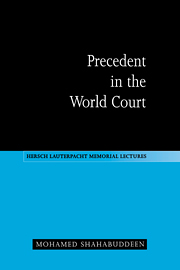Book contents
- Frontmatter
- Contents
- Foreword
- Preface
- List of abbreviations
- 1 Introduction
- 2 The growth of the Court's case law
- 3 Range of precedential resources
- 4 The bases of the system
- 5 The Advisory Committee of Jurists
- 6 The view taken by the League of Nations
- 7 The possibility of judge-made international law
- 8 Stare decisis
- 9 Distinguishing
- 10 Departing from a previous decision
- 11 Ratio decidendi and obiter dictum
- 12 Advisory opinions and decisions of chambers
- 13 The precedential impact of individual opinions
- 14 Effect and scope of the Court's case law
- 15 Conclusion
- Index
- Frontmatter
- Contents
- Foreword
- Preface
- List of abbreviations
- 1 Introduction
- 2 The growth of the Court's case law
- 3 Range of precedential resources
- 4 The bases of the system
- 5 The Advisory Committee of Jurists
- 6 The view taken by the League of Nations
- 7 The possibility of judge-made international law
- 8 Stare decisis
- 9 Distinguishing
- 10 Departing from a previous decision
- 11 Ratio decidendi and obiter dictum
- 12 Advisory opinions and decisions of chambers
- 13 The precedential impact of individual opinions
- 14 Effect and scope of the Court's case law
- 15 Conclusion
- Index
Summary
In his speech of welcome to the present Court at its inaugural meeting, The Netherlands Foreign Minister remarked as follows on the inevitability of judge-made law:
Montesquieu, in a well-known passage of his Esprit des lois, has described the function of a judge as follows: ‘Judges are but the mouthpiece which recites the law – inanimate beings who cannot moderate either its force or its vigour.’ This judgment of the great French philosopher is very far from having met with universal acceptance; it represents too rigid an interpretation of the trias politica and a conception of the administration of justice which was typical of a period in which the importance of written law was exaggerated, but was later subjected to severe criticism. This conception of the judge's function is still less applicable in international law, in which a written, established rule seldom exists. Here the judge finds himself only too often, and whether he wills it or not, obliged to assume the rôle of the law-maker. The increasing difficulties which, in recent times, have hampered the codification of international law have shown the importance of this aspect of a judge's work. The part played by case law in the formation of law becomes ever more vital; the world seems disposed to accept and to generalize a ruling given by a Court of high repute; whereas international conferences, after endless discussion, succeed neither in reconciling divergent standpoints nor in framing uniform rules of law.
- Type
- Chapter
- Information
- Precedent in the World Court , pp. 234 - 241Publisher: Cambridge University PressPrint publication year: 1996



